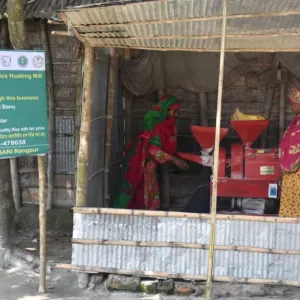Homestead agricultural mechanization empowers women in Bangladesh
by Bushra Humaira Sadaf, Md Abdul Haque, Abu Abdullah Miajy, Sharif Ahmed, Humnath Bhandari This article highlights how homestead agricultural mechanization empowers women in Bangladesh under the MFS project. In northern Bangladesh, where agriculture has long been a way of life, women are emerging as entrepreneurs, transforming their livelihoods and the dynamics of their communities. With support from the CGIAR

Homestead agricultural mechanization empowers women in Bangladesh
by Bushra Humaira Sadaf, Md Abdul Haque, Abu Abdullah Miajy, Sharif Ahmed, Humnath Bhandari
This article highlights how homestead agricultural mechanization empowers women in Bangladesh under the MFS project.
In northern Bangladesh, where agriculture has long been a way of life, women are emerging as entrepreneurs, transforming their livelihoods and the dynamics of their communities. With support from the CGIAR Research Initiative on Mixed Farming Systems, small agricultural machinery, such as fodder choppers, mini rice husking mills, and oil extractors, are changing these women’s lives.
Traditionally, agricultural operations have been labor-intensive and male-dominated. Although women have always contributed to agriculture, their roles have often been limited to household tasks. Introducing small agricultural machinery empowers women to take on more active roles in farming, increasing their involvement in agricultural operations and creating new income-generating opportunities for their families.
This is the story of three women from villages in the Nilphamari District of Bangladesh—Ratna Begum, Aruna Rani Roy, and Layla Begum—whose lives have been transformed by the use of homestead-based small agricultural machinery.

